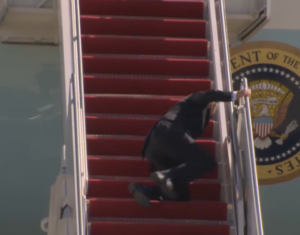First of all, Biden has LIED to the public on numerous occasions. For instance, “my son did nothing wrong.” Wrong, that was one Big Lie. Secondly, he hasn’t come clean concerning his health. 
The President is a “well-meaning, elderly man with a poor memory.” WTF, what does a poor memory have to do with recommending prosecution? Biden was a private citizen when he committed the crime. Did he have a poor memory then? Doesn’t matter, he was guilty of Federal Records Fraud.
We are confused, IS THIS ANOTHER LIE? Biden didn’t remember if he watched the debate. Again, WTF is this bag of bones talking about, couldn’t remember what he did five days ago and this guy is President. Imagine him in charge of the button?
Now we find out that a Top Neurologist visited the White House. The Deep State won’t say who he consulted with, but we know who, it was POTUS.
Biden’s physician met with top Parkinson’s disease specialist: White House visitor logs
• 36m • 2 min read
President Joe Biden’s physician met with a top Washington, D.C., neurologist who specializes in Parkinson’s disease earlier this year, according to White House visitor logs.
The logs show that Parkinson’s disease expert Dr. Kevin Cannard of the Walter Reed Medical Center met with Biden’s physician Kevin O’Connor and two others at the White House residence clinic on Jan. 17.
“It’s highly likely they were talking about Biden,” Rep. Ronny Jackson (R-TX) told the New York Post, who first reported on the meeting. “He should only be [regularly] treating the president and the first family.”
Jackson served as physician to the president under the Obama and Trump administrations from 2013 to 2018. He has issued a number of warnings about Biden’s declining mental health, and accused O’Connor and first lady Jill Biden of having “led the cover up” to hide the president’s well-being from the public.
Walter Reed Medical Center cardiologist John E. Atwood was also in the meeting, according to the logs.
Cannard published a paper in the Parkinsonism & Related Disorders journal that focuses on the “early stage” of Parkinson’s disease in August 2023, just months before the meeting.
When asked about the visit, the White House pointed to the wide range of personnel and jobs doctors visiting are responsible for.
In Biden’s interview with ABC’s George Stephanopoulos, released on Friday, he declined to commit to taking an independent cognitive test. Biden claimed his “bad” debate performance was “no indication of any serious condition.”
Kudos to George Stephanopoulos for asking very pointed questions. We commend him for this.
Below is the concealment of FDR’s health from the public.
Inside FDR’s Lifelong Health Struggles—And His Sudden Death
Roosevelt endured persistent physical challenges—including paralysis and heart issues—that were largely shielded from the American public.
FDR’s Health Falters
Roosevelt’s health began a steep decline after his nearly 18,000-mile roundtrip to the Tehran Conference in November 1943 to meet British Prime Minister Winston Churchill and Soviet Premier Joseph Stalin on strategy to fight Adolf Hitler. Upon his return, an ailing, exhausted Roosevelt lost weight, and his trembling hands struggled to light cigarettes, sign documents or pour coffee.
